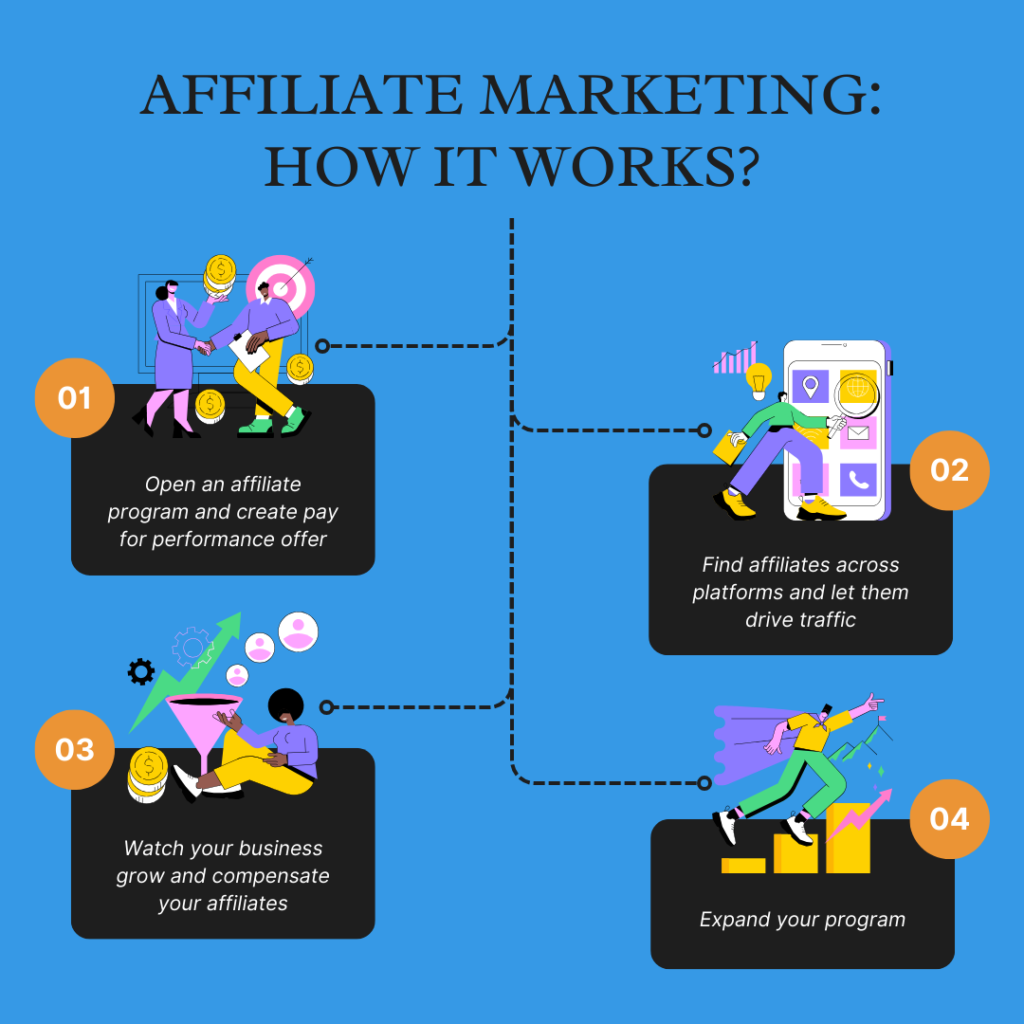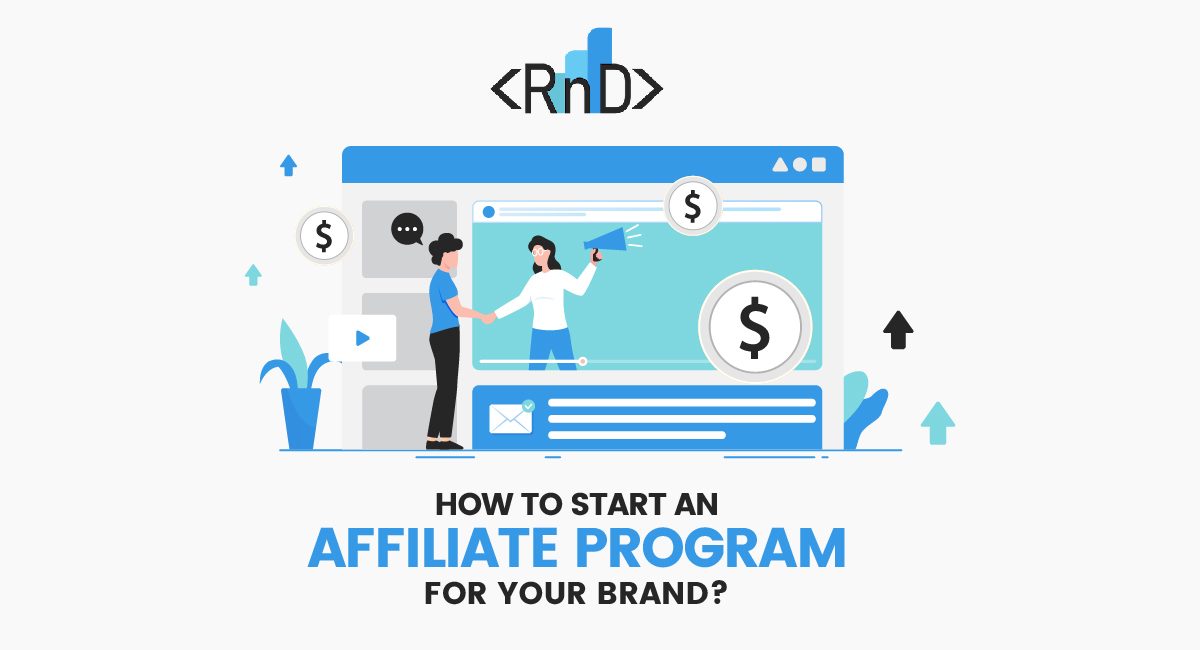So you decided to start an affiliate program for your amazing brand. Congratulations! But where do you start? How exactly is it done? Is there research to be done beforehand? How do you choose a platform? Don’t worry; RnD Marketing got you covered with everything you need to know. Let’s do this 💪!
What are we going to learn today?
What Is Affiliate Marketing 🤔?
Affiliate marketing simply means promoting your brand through a third party. To put it a bit more into context, you promote your brand through a third party and pay that third party a fee (more about fees later) that was agreed upon in advance. Your affiliates recommend your products, and you give them a “cut” once a referred user makes a purchase. Simple, right?
How Does Affiliate Marketing Actually Work?
The most common method of operation is to give affiliates a tracable link that reports back their performances to your integrated affiliate platform of choice. This platform can monitor everything from views all the way through purchases (Clicks, registrations, etc.). More on affiliate platforms later on.

Why Is It Important to Create Your Own Affiliate Program?
This question comes up quite often with our clients. While it can be answered with a few very convincing answers, the answer I would go for is always the same: Affiliates and partners will bring your brand to places on the internet that no one else could.
Affiliates constantly try to reinvent themselves and the way they provide traffic in order to earn commissions. And so, they’ll think of ways to generate your next customer that you never thought of.
You will be surprised at what they can come up with if you provide them with the infrastructure to succeed.
Benefits of Having Your Own Affiliate Program
There are many benefits to having your own affiliate program, here are the main ones.
Boosting Product Sales
Having a healthy affiliate program means having another channel that streams leads and sales into your organization. Traffic that comes from affiliates is very targeted and considered to be of high quality.
Expanding Brand Awareness
As I mentioned above, affiliates will get your brand to corners of the internet that you will not be able to reach on your own. While we all want to see customers at the end of the pipeline, the traffic your brand will get from affiliates will build a blessed awareness.
Enhancing SEO Through Backlinks
Adding an affiliate program to your brand creates an ecosystem for your brand. In this case, your affiliates support and help your SEO efforts. here’s how:
- Quality Backlinks: When affiliates promote your brand, they will usually use affiliate links to direct users back to your site. If these affiliates have authoritative and relevant sites, the backlinks can positively impact your site’s SEO by indicating to search engines that your website is trustworthy and valuable.
- Diverse Link Profile: Search engines like to see a diverse link profile (links from various sources). Affiliates can help this cause if the nature of their sites is different from one another. Having multiple types of sites (like blogs, comparison sites, and forums) sending links back to yours might improve your SEO results.
- Content Creation: Affiliates, especially ones that know that unique content is needed, often create content to promote your products or services. This can lead to more relevant and valuable content related to your offerings, which can attract backlinks from other sources interested in the same topic. Search engines reward websites that provide valuable and informative content.
- Link Relevance: Relevance of the websites linking to yours is crucial. Search engines reward websites with high relevance linking to your website so try and aim for affiliates who operate in a similar or complementary niche.
Advantages and Disadvantages of Affiliate Marketing
If you reached this far, you probably got it that we are big fans of affiliate marketing – we’ve gone through what values it can bring to your brand. In order to keep things fair, I want to talk about the disadvantages or challenges of affiliate marketing.
Advantages of Affiliate Marketing 👍
- Cost-Effective: Affiliate marketing is often very straightforward when it comes to cost. Sure, you have the costs that come with building the department. But once you are running, your payments, in most cases, are only being generated once a sale has happened.
- Increased Reach: As discussed before, with affiliate marketing you’ll reach corners on the internet that you otherwise wouldn’t. Affiliates will find a way to spread your word and get your brand shown on sub-niches related to you.
- Scalability: There is no limit to how many affiliates you can work with or how many customers or leads these affiliates can send you. You can scale your existing affiliates by offering better commissions or attract new affiliates by offering special commissions for new partners – the sky is the limit.
- Expertise and Credibility: Affiliates are often experts in their niches and can add credibility to your amazing product as well as expertise (e.g.: review websites).
- Performance Tracking: With the affiliate platforms that are available today, you can track affiliates’ performances down to the click. This gives you full control of the traffic you’re getting and the ability to optimize it.
- Minimal Risk: You are paying for results, so the risk of spending money without seeing anything back is very low. I should mention that many affiliates today ask for set-up fees on top of performance commissions. A good affiliate will earn you back that fee with time.
Disadvantages of Affiliate Marketing 👎
- Quality Control: You’ll need to be 100% hands-on to monitor and control the quality of the traffic that your affiliates send you. Don’t forget that you are paying money for success (you define success – it can be leads, sales, clicks, etc.) so don’t be surprised that people will try to abuse it by spamming or sending fake traffic.
- Reputation Risk: Monitoring your affiliates and making sure that they speak your brand’s language and messaging, and using correct information is part of the job.
- Commission Costs: Always check the commission rates you offer and pay affiliates. It is okay to pay an affiliate a bit more if it helps to scale but make sure your overall ROI is at least 130%. If it isn’t you’ll need to have a look into what you’re paying your partners.
- Time Investment: Building an affiliate program is not magic. It takes time until you see results and you’ll have to be patient. In most cases, it pays off but you’ll have to work hard to get there.
Although you may face challenges in affiliate marketing, with the right guidance and experience, you will be able to tackle and overcome them. As you can see above, the pros outnumber the cons, and choosing to start an affiliate program is an action we highly recommend.
Preparations for Your Affiliate Program (Before It Is Live and Running)
Before you start your affiliate program, there are a few steps that you need to take. these steps are very important especially because they will determine how your affiliate program looks like, its roadmap, goals, and its’ nature. Let’s cover what those steps are.
- Market Research: You have to know what the market looks like in your vertical: Are your competitors using affiliate marketing? Are there enough affiliates to work with? how much affiliates in this vertical are being paid? All these are very important to know beforehand as they will help decide whether or not affiliate marketing is the right move for your business.
- Determining Your Goals: What would you like to achieve by starting your own affiliate program? Is it sales? brand awareness? low risk? Deciding what your goals are will determine what kind of affiliates you are going after, who would you like to be exposed to your brand, and how much you pay for it.
- Identifying Your Audience: This is a big one… If your business is already running, you already know who are your customers and who are you aiming for to see your ads. If you haven’t already, know who your customers are before you start an affiliate program (or any other channel for that matter).
- Deciding on Commission Rates: This is another important decision. What are you going to pay your affiliates and partners? Of course, there are the odds, big affiliates for which you’ll pay a bigger commission or flat fee but you’ll need to have a generic commission that will be paid to affiliates that are promoting your brand. You also have to decide if you’re going to pay any other commission on top of anything you decide upon. e.g.: paying % of revenue AND CPA (cost per action) for customers that affiliates send you.
- Choosing Your Affiliate Platform: All your affiliate activity will happen on an affiliate platform. Today, most affiliate platforms offer more or less the same features and the decision is basically down to ease of use and price. Bear in mind that choosing an affiliate platform is like a catholic wedding and it will be very hard to switch to another.
Preparations for Your Affiliate Program (Once It Is Live and Running)
So, you did all of the above, and after a couple of months of preparations your affiliate program is live! you are asking yourself: “OK, what now?”
Affiliate management is divided into 2 main duties: Acquisition and Retention which should split 50% of your time each.
Under Acquisition, you have 2 very important things to do:
- Finding Affiliates You Want to Work With: Identify the affiliates you want to work with – They can be SEO, PPC, or Social affiliates, and put them all in a list for you to work on later. Depending on your vertical, bear in mind that not only the above-mentioned so-called affiliates can send you traffic, so think outside of the box here as you’ll be surprised who can be an affiliate of yours. Just an example: If your business sells a SAAS product and another company’s user needs it to use the product, that company can be your affiliate.
- Reaching Out (Hunting): When it comes to reaching out (hunting), before crafting your reach-out message, you’ll need to decide what approach are you going to take. Aggressive? laid back? somewhere in the middle? This is totally for you alone, don’t expect your team to take the same approach as you. Once you decide, craft your message – it has to be short and has to include the following: Intro, what your company does, what kind of partnership are you thinking of, and a closer. You can elaborate on all the above and more (like payouts, more products that your company has, etc.) on the next call. Also, make sure that your message is relevant to the affiliate.
For example: If you reach out to an affiliate whose website is all about shirts, make sure the message you send him is about shirts and not socks – Sounds like a silly thing to do, right? Many brands that have more than one product send messages to affiliates about their whole range of products and lose good affiliates because they get bored.
Managing and Monitoring Your Affiliate Program
So your affiliate program is up and running, you’re working with some nice affiliates that send you traffic, and you even manage to get some sales… So what’s now? where do we go from here?
Well, let’s start with the fact that you should never stop hunting and recruiting new affiliates. But there are a few key tasks that are being add up to to your daily routine once your affiliate program is live.
Tracking Affiliates’ Performances
The first one is a simple one – Track the traffic you are getting from your affiliates. What is the quality of it? What is the conversion rate? Does it stand by industry standards? If not, why is it below (or above)? While affiliate marketing is a bit different than the other channels, you will still have to make the hard decisions based on the data that you have – Stopping an affiliate from sending you traffic or deciding to pay an affiliate more in order for him to scale. There is not a dull moment and you have to be on top of things every day.
Ensuring Compliance With Program Policies
When setting up affiliate programs, you’ll have to set guidelines for which affiliates will have to comply. For example: Affiliates that run PPC campaigns are not allowed to bid on your keywords. Or SEO affiliates must produce their own unique content, or maybe not target a specific geolocation… It doesn’t matter what are your rules, you’ll have to make sure all of your affiliates are playing by them, every day. There are ways and tools in which you can monitor those activities.
Paying Out Affiliates
Sit tight, this is a big one. Paying your affiliates is the most important thing that you have to do! If your T&Cs state that you’re paying on the 15th of every month – you don’t do anything else until you know payments will go out by the 15th.
Delaying payment on a regular basis, or not paying affiliates at all will literally kill your program. Don’t forget that it was affiliates that brought you this far and they can easily take you down if they spread the word that you’re not paying (Just like they spread the word about your amazing product).
Your payments are delayed or god forbid not going out at all? Make sure your affiliate knows about it in advance and be there to face their anger, unhappiness, or whatever it may be.
Tips for a Successful Affiliate Program
There are a few things that we need to cover which I believe will help your affiliate department thrive. If manage to live by those, you’re on your way up. Here are things that are essential for your success.
Maintaining Open Communications With Your Affiliates
It is very important that you speak to your affiliates as much as you can: Ask how are their campaigns going, what challenges are they facing, and what would they need in order to succeed and deliver better results which will lead to better results for you and more commission for them. Make sure that they are informed on everything at any given time – this goes for the bad side of it too like system maintenance which will result in the system not being able to track or maybe if you’re not happy with the results they’re providing you.
The bottom line is that you leave no room for surprises! Those affiliates are your business partners and you must treat them as such – for the good and the bad of it.
Providing Ongoing Training and Support
Affiliates are masters of their own trade, but you can always learn more. Make sure to share knowledge (especially new knowledge) with them – If you know that a paid campaign delivers better results after adjustments to audience targeting, share that information. If running ads on a new platform works well for one affiliate, share the case study with others. It will go a long way with your affiliates if they see that their success is important to you.
Providing support is also vital – you will be contacted if the system is not working, an affiliate needs help understanding your reports, or maybe just an affiliate that needs a new banner – make sure that your affiliates get a response in time.
Transparency
It doesn’t matter what is your vertical, you should aim to be as transparent with your affiliates as possible. Make sure they see all the stats, funnels, and revenues that they are generating for your business. We mentioned before that affiliates are masters of their own domain and having access to those numbers will drive them to improve your campaigns. Many companies today do not display to affiliates the full picture and it might work in the short run but when looking ahead for an ongoing partnership, being transparent will only benefit you.
Get Personal
This last thing is a bit different but as important as anything I mentioned in this article. At the end of the day, most affiliates are hard-working individuals who do whatever they can to make a living. Asking about their personal lives, how things are going, buying them a coffee, or taking them out for a drink (if you live in the same country) will strengthen your relationship.
Final Thoughts
So there you have it, we laid everything you need in order to start your own affiliate department before you. The key takeaway for us would be that if you do things the right way, affiliates and partners can really take your brand to the next level. You’ll get your desired exposure, traffic will come in and we are certain you’ll see your revenues rocketing.
It is important to follow the vitals I wrote about here as they can be considered as the pillars of affiliate departments.
Affiliate marketing services are just one of the services that we offer and we specialize in building, maintaining, and optimizing your affiliate department.
Frequently Asked Questions
Affiliate marketing simply means promoting your brand via a 3rd party.
The most common method of operation is giving affiliates a tracable link that reports back their performances to your integrated affiliate platform of choice.
Affiliates and partners will bring your brand to places on the internet that no one else could.
Affiliates constantly try to reinvent themselves and the way they provide traffic in order to earn from commissions. And so, they’ll think about ways to generate your next customer that you never thought of.
Cost-effective, increased reach, Scalability, Expertise and Credibility, Performance Tracking, Minimal Risk
Market research, Determining your goals, Identifying your audience, Deciding on commission rates, Choosing your affiliate platform





